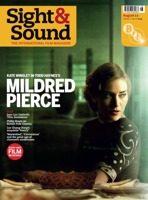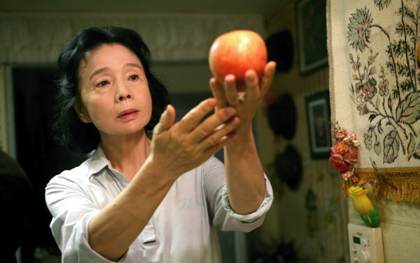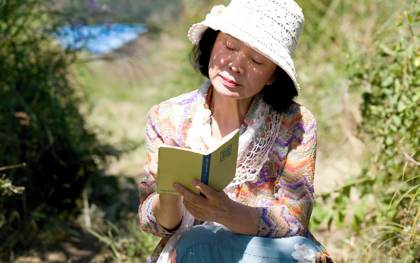Primary navigation

Republic of Korea / France 2010

Reviewed by Trevor Johnston
Our synopses give away the plot in full, including surprise twists.
Our synopses give away the plot in full, including surprise twists.
South Korea, present day. A small rural community is shocked by the suicide by drowning of high-school student Hee-jin, who was sexually abused by her male classmates. Mija is a 66-year-old woman who lives with her uncommunicative teenage grandson Wook. Diagnosed with the early stages of Alzheimer’s, Mija starts poetry classes at the local adult education centre, where the tutor encourages his students to see the beauty of the world and write their own poem by the end of term.
A phone call from the father of Wook’s friend Kibum alerts Mija to the fact that Wook was among the gang responsible for driving Hee-jin to suicide. The fathers of the guilty boys plan to offer blood-money to the dead girl’s peasant mother to stop further legal action; Mija agrees to contribute but does not approve. As she tries to see the world anew to craft her poem, a sense of resistance awakens in her. Moved by the powerlessness of Hee-jin’s single mother against the men’s closed ranks, she successfully blackmails Mr Kang, the wealthy stroke victim she nurses part-time, for her share of the blood-money. Mija then turns Wook in to a sympathetic local policeman who attends local poetry-circle gatherings.
Mija is the only student to have completed a poem, but does not attend class to read her moving elegy, told from the otherworldly perspective of Hee-jin. Her identification with the tragic young girl is by now complete, and they share the same watery fate.
For ‘poetry’, of course, read ‘cinema’. Lee Chang-Dong is hardly the first filmmaker to send a protagonist on a journey of discovery that changes their perception of the world, but no one’s ever put a sixtysomething granny in the early stages of Alzheimer’s through an adult-education poetry class as a way of crafting a social statement about a self-absorbed patriarchy’s paucity of human insight. We watch and learn – about South Korea certainly, but about ourselves too – though this never becomes a duty, since Lee’s enviable level of accomplishment seemingly precludes didacticism. Here’s a filmmaker with a conscience, that’s for sure, but one who deploys it in an astringent challenge to our assumptions rather than sentimental pandering. Lee is esteemed at home and on the festival circuit (he’s a regular in competition at Cannes), but this is the first of his five features to secure UK theatrical distribution. It’s fair to say that the subject-matter, encompassing poetry, dementia, sexual abuse and suicide, is likely to be a hard sell, but the quality of the film is such that it simply demands an airing.
From the socially maladjusted ex-con finding a soulmate in a young woman with cerebral palsy (Oasis, 2002) to the everyman rejecting the roles of soldier, policeman and businessman thrust upon him by Korea’s recent history (Peppermint Candy, 1999) and the unmarried handyman unrequitedly devoted to a young widow whose life is subsumed by tragedy (Secret Sunshine, 2007), the subjects of Lee’s films are people who can’t or won’t accede to what’s expected of them.
Here the elderly Mija reacts to news of her irreversible Alzheimer’s by signing up for a poetry class. She’s losing her words (even everyday ones like ‘electricity’ and ‘wallet’), so why even enter an arena that’s about shaping enhanced perceptions through the skilled command of language? In essence, that’s the puzzle which drives the story forward, as the viewer tries to make connections between this poetic thread and the unfolding dilemma whereby the old lady is inveigled into coming up with her share of the blood-money being raised by the fathers of the teenage boys (her surly grandson Wook among them) whose rape of their high-school classmate Hee-jin drove the poor girl to drown herself.

Leading lady Yun Jung-Hee, a Korean screen legend who emerged from 16 years of retirement to provide the latest in a series of truly remarkable female performances in Lee’s filmography, proves uncannily adept at showing how Mija’s ostensibly benign floral-print-wearing dottiness masks a strength of will intensifying by the day. After capriciously walking out of the men’s self-important pow-wow, the manner in which she comes up with the dosh turns the power and influence of machismo back on itself in a highly pointed manner.
Lee’s film isn’t exactly over-plotted yet this worm-that-turns narrative plays out to compelling effect, largely because it leaves us to piece together Mija’s motives and methods. In what is an effective counterpoint to Bong Joon-Ho’s Mother (where the social observation stems from the matriarch’s determination to deny her slow-witted son’s guilt in a murder case), Lee never seems to be pushing too hard, his unshowy formal technique relying on a characteristic facility for thoroughly convincing blocking of the performers, so it often appears as if the camera has simply wandered into some already ongoing real-life confrontation.
The results are disarmingly powerful, and not just in the way we come to sense how Mija’s misadventures with the local poetry-appreciation society – frequently hijacked by men egotistically parading their would-be sensitivity – effectively dovetail with the rape storyline by highlighting the male sense of entitlement seemingly running through every layer of Korean society. Lee is astute enough not to make all the men unsympathetic, but we take the point that Mija’s opening up to a deeper understanding of her place in the world is a touching if belated act of resistance against the prevailing notion that the world doesn’t belong to women like her but to the sort of men who can buy their way out of justice.
At which point Lee finds another gear not otherwise present in his work to date, shifting out of a register of combative Imamura-esque social engagement into an even more – yes – poetic realm of expression. Mija’s endeavours culminate in an all-consuming identification with the suicide victim Hee-jin, setting up a closing gesture of transcendence achieved through Mija’s written words and Lee’s images of running water. Somehow it’s at once a moment of liberating individual release and a bleak recognition of an intransigent status quo, and it lifts what is already a rich and compassionate film into something approaching greatness.